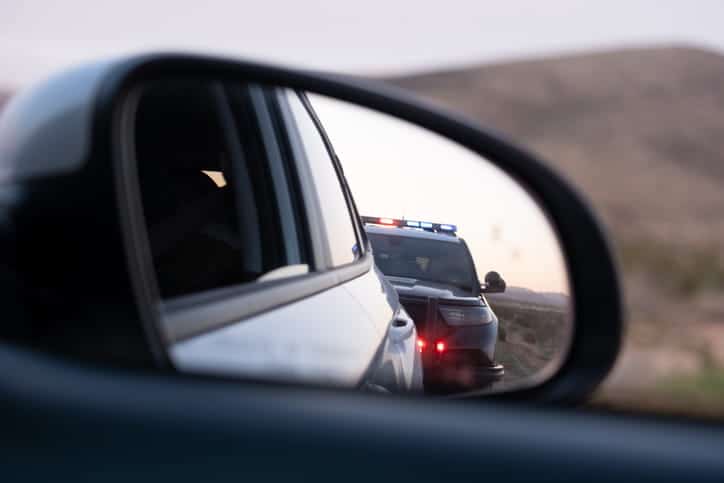The Las Vegas Metro Police Department, North Las Vegas Police Department, and Henderson Police Department have jurisdiction over millions of residents and visitors. They investigate tens of thousands of complaints, crimes, and auto accidents annually.
With so much at stake, these agencies are not known for their subtlety. Officers stop and talk to dozens of people every day. This assertive strategy raises the question, “Can police pull you over for no reason?” The answer to this question is deceptively complicated because it depends on the stop’s purpose and duration.
The lawyers at Adam S. Kutner, Injury Attorneys, have successfully settled or won over 50,000 cases. The firm’s founder is a former insurance defense lawyer who understands the tactics used by insurers to defend against personal injury claims. He uses his knowledge to help injured clients fight for fair compensation under Nevada law.
GET YOUR FREE CAR ACCIDENT CONSULTATION
NO FEES UNLESS WE WIN!
Importance Of Legal Police Stops

You might wonder why a law firm that does not handle criminal cases cares about impermissible police stops. However, society has an interest in ensuring government agencies, including police departments, follow the law.
The U.S. Constitution sets limits on government power, and police officers must observe them when performing their duties. Lawyers, regardless of their practice areas, want fairness and justice for officers and the people they investigate.
On the other hand, Nevada has a serious problem with DUI accidents. From 2017 through 2021, impaired drivers were responsible for 44% of all traffic fatalities in the state. The police should use every lawful measure at their disposal to prevent these tragedies.
Finally, drivers impaired by drugs or alcohol impose an enormous cost on victims, their families, and the healthcare system. Victims injured in DUI crashes may incur thousands of dollars in medical expenses and lost income. When victims suffer fatal injuries, their families experience grief in addition to their financial losses. If the police can prevent these crashes, victims and their families can avoid these burdens.
Call (702) 382-0000 For a Free Consultation
Balancing The Competing Legal Interests
The law governing police traffic stops balances competing legal interests. First, the Fourth Amendment to the U.S. Constitution protects people from unreasonable searches and seizures, meaning the police must have a warrant, or the investigation must fall under the exceptions to warrant requirements.
Second, the police require strong tools to investigate crimes and enforce the laws. More importantly, automobiles are mobile, and any delay can hinder the police in stopping a crime in progress or apprehending a fleeing suspect.
To balance these interests, the police can stop someone under only a few circumstances:
Arrest Or Search Warrant
A warrant is permission from a judge to arrest someone or conduct a search. Before issuing a search warrant, the police must submit a probable cause statement that explains the grounds for the search, where the police plan to search, and what they intend to seize. If the police have a warrant to search your vehicle, they can stop you and conduct a search.
Probable Cause Plus Exigent Circumstances
“Probable cause” means the police officer has a reasonable suspicion that you committed a crime. Exigent circumstances usually mean the officer faces an urgent situation such that the delay in getting a warrant would allow you or the evidence to disappear.
Courts recognize that exigent circumstances often apply to vehicle stops because of their mobility. By the time a judge authorizes a search warrant after the police observe you weaving in traffic, you could have time to go home and sober up. Thus, the police usually have the authority to stop you when they observe you violate a law or traffic rule.
DUI Checkpoints
Oddly, the police have the authority to stop everyone on the road. On holidays like New Year’s Eve or after a Las Vegas Raiders game, you might see the police set up roadblocks on the Summerlin Parkway or other major roads to check for drivers impaired by drugs or alcohol. This procedure has several names, including:
- Administrative checkpoint
- Sobriety checkpoint
- DUI checkpoint
At a checkpoint, the police don’t need a reason to stop you. If you are driving on the road and arrive at the checkpoint, they can pull you over. However, the police are more limited in what they can do during these stops compared to a targeted stop. For example, the police cannot hold you any longer than the time it takes to determine your identity and fitness to drive.
Can A Police Officer Stop You For No Reason?
Police officers cannot stop you for no reason. However, they also have a very low threshold for the reasons used to stop you. Some common grounds for stopping drivers include:
Equipment Violations
A cop can stop you if your vehicle lacks the equipment required by law. Thus, the police can stop you if one of your brake lights is broken or missing.
Traffic Violations
A police officer can stop you if they observe you violating a traffic law. This is the ground used to stop speeders. The police use radar or laser devices to measure your vehicle’s speed. If it exceeds the speed limit, the police officer can stop you.
Officers can also use their sensory observations to provide grounds for a traffic stop. If the cop observes you traveling under the speed limit but unreasonably fast for the weather or road conditions, they can stop you for speeding.
Warrants Or Investigative Questioning
Suppose that a judge issued a warrant for your arrest. A police officer can stop your vehicle if they recognize you or your vehicle based on the warrant issued.
A similar situation can apply if you are wanted for questioning. For example, suppose your ex-spouse reports that you did not return your child as scheduled in a custody order. The police can look for your vehicle and stop you to question you about the child.
Probable Cause
Sometimes, the police do not necessarily observe the commission of a crime. However, they may suspect you of a current or past crime. If their suspicion is reasonable, they can stop you to conduct an investigation.
What Is Reasonable Suspicion?
A reasonable suspicion is an observation that would lead a reasonable person to believe that you or your vehicle was involved in a crime. Thus, the police could have a reasonable suspicion that you caused a hit-and-run accident if you have a broken fender and drive the same color and type of vehicle as the one reported.
Similarly, an officer might have a reasonable suspicion that you are driving under the influence of drugs or alcohol if you were driving slowly on the Strip and hit the curb while turning onto Flamingo Road.
Reasonable suspicion does not need to be correct. You might have damaged your bumper when you scraped the side of your garage. Your car might have mechanical problems, and perhaps you’re simply trying to get to a safe place to call a tow truck. Even if you’re innocent, the police officer can legally stop you if the reason for the stop was rational.
When Is A Stop Illegal?
A stop is illegal when it does not fall into any of the legal stop categories. In other words, the default assumption is that the police cannot stop you unless they can show that the stop fell into one of the accepted categories.
Suppose an officer pulls you over because they saw you leaving a bar’s parking lot. If you did not violate any traffic laws and the stop was targeted rather than a universal checkpoint, the stop was probably illegal. To conduct a targeted stop like this, the officer would need to follow you long enough to develop probable cause to stop you. If they don’t have a reasonable suspicion to support the stop, they’re violating the Constitution.
These restrictions apply even if it turns out that you were drunk. The police must have probable cause before stopping you. They cannot develop probable cause after pulling you over. Instead, they must first observe something that gives them a reasonable suspicion of your impairment, such as reckless driving, and then pull you over based on that suspicion.
Similarly, the law imposes restrictions on DUI checkpoints. These checkpoint protocols dictate how these stops are conducted. If the police violate these rules, any arrests they make at the checkpoint might be unconstitutional.
For example, the police cannot discriminate based on sex or race while stopping drivers at a checkpoint. If the police wave everyone through the checkpoint except Hispanic males, they have probably conducted the stops illegally.
When Can You Get Arrested For A Dui?
Every state has a law against impaired driving. Moreover, most states, including Nevada, provide the following two grounds for a DUI arrest:
Impairment Violation
An impairment violation happens when the officer sees a driver do something unreasonably dangerous. Based on this observation, the officer has probable cause to stop the driver and investigate whether they are intoxicated by administering a field sobriety test. This test measures the driver’s physical coordination and mental faculties.
To establish this violation, prosecutors must prove the following elements:
- The driver was under the influence of alcohol, drugs, or inhalants
- The driver was incapable of driving safely or controlling the vehicle
In a prosecution for an impairment violation, prosecutors will usually rely on the testimony of the officer, dashcam videos, and bodycam footage. This evidence will show the driver’s capability to drive the vehicle and their level of intoxication when speaking to the officer or performing a field sobriety test.
If the driver slurs their words, has trouble focusing their eyes, or lacks coordination, the officer probably has enough evidence to make an arrest, and prosecutors can probably file criminal charges.
Importantly, an impairment violation can happen regardless of the driver’s blood alcohol concentration. In other words, an officer can arrest someone for an impairment violation even if their blood alcohol concentration is below the legal limit. This distinction is important in a few contexts.
First, the police can stop and arrest drivers who are susceptible to intoxication due to their size or ability to metabolize alcohol. Most drivers become at least “buzzed” after a drink or two. Some will become so impaired with just one or two drinks that they cannot drive safely.
Second, the police can stop and arrest drivers who have no alcohol in their systems but are instead driving under the influence of cannabis, illegal drugs, prescription medication, or inhalants. As a result, the police can simply rely on the driver’s actions when investigating drug-related cases.
Per Se Violation
A per se violation occurs when a driver operates a vehicle with a blood alcohol content over the legal limit of 0.08%. This limit means that in any sample of blood, alcohol accounts for 0.08% of the weight of the sample.
Nevada law allows officers to use urine or breath samples to estimate the amount of alcohol in the blood. However, since blood tests are more accurate than urine or breath tests, officers will often conduct a blood draw after arresting the driver and taking them into custody.
Nevada also sets legal limits for other intoxicating substances. These limits apply to the following drugs:
- Marijuana
- THC
- Amphetamines
- Cocaine
- Heroin
- Morphine
- LSD
- Methamphetamine
- PCP
To prove a per se violation, prosecutors only need a chemical test showing the concentration of the substance in the driver’s blood was over the legal limit. They do not need to prove that the substance impaired the driver’s abilities.
However, to support the initial stop, the police still need probable cause. As a result, officers will still rely on some observation, such as speeding or weaving in traffic, that leads them to suspect a DUI before pulling the vehicle over.
Risks Of A DUI
Impaired drivers face many risks. An arrest and conviction for a DUI can result in the following punishment:
- Imprisonment
- Fines
- Restitution for damage or injuries caused
- Driver’s license suspension
- Mandatory drug or alcohol treatment
If a driver commits a DUI offense in a road work zone or pedestrian safety zone, the judge can increase the penalty. Similarly, serious bodily injuries or fatalities that result from a DUI accident can result in even greater penalties. In these cases, an intoxicated driver might be grateful that an officer pulled them over before they caused a crash.
In addition to any criminal penalties, drunk drivers and their insurers are also liable in civil cases for the losses incurred by crash victims. Under Nevada’s fault-based car insurance system, all vehicle owners must buy liability insurance. After a crash, accident victims can seek compensation for the following:
- Past and future medical costs
- Past income losses
- Future earnings losses
- Pain and suffering
To prove liability, the crash victims and their Las Vegas car accident attorneys must show the other driver was negligent in causing the crash. Negligence means the driver failed to exercise reasonable care and, as a result, set into motion a sequence of events that ended with the victim’s injuries.
An impaired driver will usually be found negligent because they knew or should have known that driving after using drugs or alcohol would expose other road users to the risk of injury or death. In other words, the driver’s liability stems from both the act that led to the collision, such as tailgating, losing control of their vehicle, or other traffic violations, and the fact that they were on the road in an impaired condition.
Importantly, even though insurers often deny coverage for criminal acts of policyholders, they usually cover losses from DUI crashes.
What If An Officer Pulled You Over For No Reason?
Looking at the other side of the case, drivers wrongfully stopped have several remedies for the police officer’s unconstitutional actions. These remedies include:
Suppression Of Evidence
Any evidence gathered during an unconstitutional traffic stop is inadmissible in a court case. The court will suppress not only evidence illegally gathered but also any other evidence that flows from it.
For example, suppose the police stopped a driver illegally and, based on the driver’s impairment, searched the back seat of the vehicle. If the police found a gun during that search, a court might throw out that evidence since it flowed from the illegal stop.
Dismissal Of Charges
Prosecutors need evidence to support charges. If the courts suppress the evidence gathered by the police, the prosecutors might need to dismiss the charges against the driver.
Claims Against The Police Department
In certain situations, a driver illegally stopped might have civil rights claims against the police department. This usually happens if the department discriminates against the driver in conducting the stop. Thus, a checkpoint that only stops drivers of a certain race might give those drivers a claim for damages against the police agency operating the checkpoint.
Permissible And Impermissible Police Stops
Police stops are a necessary law enforcement tool. However, police stops conducted without probable cause are illegal and may give those stopped claims against the police.
Call (702) 382-0000 For a Free Consultation
Areas We Service in Las Vegas, Nevada
Henderson | Anthem | Summerlin | Paradise | Summerlin North | Summerlin South | Sunrise Manor | Nellis AFB | Desert Shores | Downtown South | Charleston | Richfield | Crestwood | Angel Park Ranch | Queensridge | Casa Grande Pines | Winchester |
Adam S. Kutner reviews and testimonials
“We were in a car accident – we were coming off of the interstate and were waiting – yielding at the exit and a car sped through the exit and smacked us in the rear.
It was definitely scary especially because we had our baby in the car. My husband and I and our baby in the back seat. We definitely – immediately went back in and checked on her to make sure she was okay.
We definitely had back pains my daughter had headaches. She kept holding her head and crying. It was pretty bad. I remember seeing a couple billboards and a friend of mine did say they had a pleasant experience with Adam Kutner, so we called them right up. They definitely were thorough, and you could tell just by talking to the people in the office that they genuinely cared about their clients.
They contacted us saying you know, explain the process on how the settlement gets done and about a week after that happened we had our settlement which was great and in my opinion Adam S. Kutner is the best attorney in Las Vegas.”
– Janae Reynolds. 5/5 Stars
START YOUR FREE CONSULTATION
NO FEES UNLESS WE WIN!
SE HABLA ESPAÑOL
Call Now! Free Consultation!

Adam S. Kutner
PERSONAL INJURY LAWYER
With more than 34 years of experience fighting for victims of personal injury in the Las Vegas Valley, attorney Adam S. Kutner knows his way around the Nevada court system and how to get clients their settlement promptly and trouble-free.












